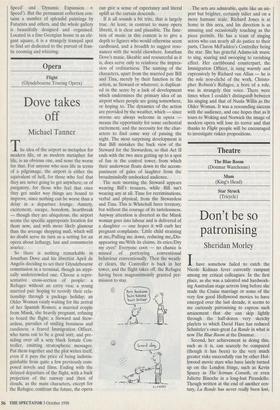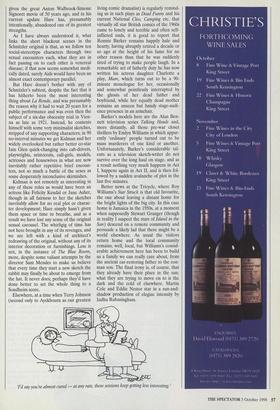Theatre
The Blue Room (Donmar Warehouse) Mum (King's Head) Star Struck (Tricycle)
Don't be so patronising
Sheridan Morley
Ihave somehow failed to catch the Nicole Kidman fever currently rampant among my critical colleagues. In the first place, as she was a talented and hardwork- ing Australian stage actress long before she made the Cruise marriage or some of the very few good Hollywood movies to have emerged over the last decade, it seems to me curiously patronising to express such amazement that she can skip lightly through the half-dozen very sketchy playlets to which David Hare has reduced Schnitzler's once-great La Ronde in what is now The Blue Room at the Donmar.
Second, her achievement in doing this, such as it is, can scarcely be compared (though it has been) to the very much greater risks successfully run by other Hol- lywood movie stars who have lately turned up on the London fringe, such as Kevin Spacey in The Iceman Cometh, or even Juliette Binoche in a long-lost Pirandello. Though written at the end of another cen- tury, La Ronde has never really been lost, given the great Anton Walbrook-Simone Signoret movie of 50 years ago, and in his current update Hare has, presumably intentionally, abandoned one of its greatest strengths.
As I have always understood it, what links the short blackout scenes in the Schnitzler original is that, as we follow ten social-stereotype characters through two sexual encounters each, what they are in fact passing on to each other is venereal disease; if that now seems somewhat medi- cally dated, surely Aids would have been an almost exact contemporary parallel.
But Hare doesn't bother with any of Schnitzler's subtext, despite the fact that it has hitherto been the most interesting thing about La Ronde, and was presumably the reason why it had to wait 20 years for a public performance and was even then the subject of a six-day obscenity trial in Vien- na as late as 1921. Instead, he contents himself with some very minimalist sketches, stripped of any supporting characters; in 90 no-interval minutes we get Kidman and her widely overlooked but rather better co-star lain Glen quick-changing into cab-drivers, playwrights, aristocrats, call-girls, models, actresses and housewives in what are now inevitably rather repetitive brief encoun- ters, not so much a battle of the sexes as some desperately inconclusive skirmishes.
Kidman is not remotely as interesting in any of these roles as would have been an actress like Felicity Kendal or Jane Asher, though in all fairness to her the sketches inevitably allow for no real plot or charac- ter development; Hare simply hasn't given them space or time to breathe, and as a result we have lost any sense of the original sexual carousel. The whirligig of time has not here brought in any of its revenges, and we are left with a kind of architect's redrawing of the original, without any of its interior decoration or furnishings. Less is not, in the instance of The Blue Room, more, despite some valiant attempts by the director Sam Mendes to make us believe that every time they start a new sketch the rabbit may finally be about to emerge from the hat. It never does; perhaps they'd have done better to set the whole thing to a Sondheim score.
Elsewhere, at a time when Terry Johnson (second only to Ayckbourn as our greatest living comic dramatist) is regularly remind- ing us in such plays as Dead Funny and his current National Cleo, Camping etc. that virtually all star British comics of the 1960s came to lonely and terrible and often self- inflicted ends, it is good to report that Ronnie Barker remains happily hale and hearty, having abruptly retired a decade or so ago at the height of his fame for no other reason than that he was suddenly tired of trying to make people laugh. In a remarkable act of fatherly duty he has now written his actress daughter Charlotte a play, Mum, which turns out to be a 90- minute monologue for her, occasionally and somewhat pointlessly interrupted by the ghosts of her dead father and boyfriend, while her equally dead mother remains an unseen but handy stage-audi- ence presence in an armchair.
Barker's models here are the Alan Ben- nett television series Talking Heads and, more distantly, all those pre-war closet thrillers by Emlyn Williams in which appar- ently 'ordinary' people turned out to be mass murderers of one kind or another. Unfortunately, Barker's considerable tal- ents as a television sketch-writer do not survive over the long haul on stage, and as a result nothing very much happens in Act I, happens again in Act II, and is then fol- lowed by a sudden avalanche of plot in the last five minutes.
Better news at the Tricycle, where Roy Williams's Star Struck is that old favourite, the one about leaving a distant home for the bright lights of the big city. In this case home is Jamaica in the 1950s, at a moment when supposedly Stewart Granger (though in reality I suspect the stars of Island in the Sun) descend on a remote community and persuade a likely lad that there might be a world elsewhere. As usual the visitors return home and the local community remains, well, local, but Williams's consid- erable achievement here has been to build us a family we can really care about, from the ancient car-restoring father to the con- man son. The final irony is, of course, that they already have their place in the sun; what they are trying to move on to is the dark and the cold of elsewhere. Martin Cole and Eddie Nestor star in a sun-and- shadow production of elegiac intensity by Indhu Rubasingham.
`I'd say you're almost cured — at any rate, these sessions keep getting less interesting.'











































































 Previous page
Previous page